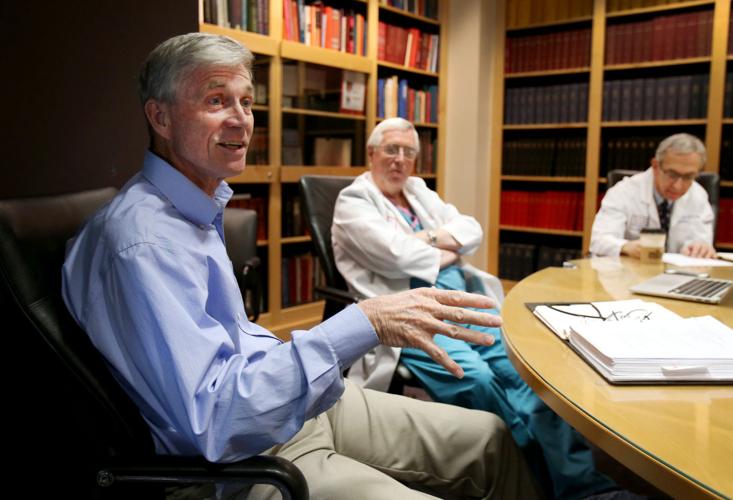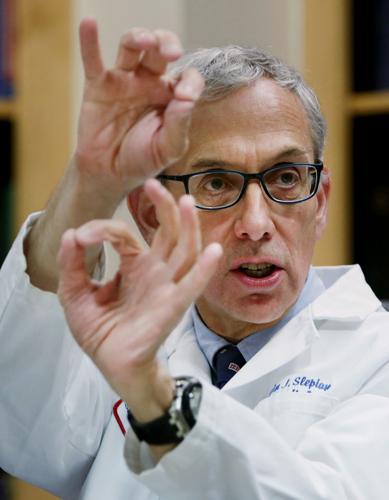Brian Duffield will tell you his survival from sudden cardiac arrest 10 years ago was simply about luck, about being in the right place at the right time.
His passion now is to ensure others don’t have to leave it to chance.
And that’s why Duffield, who was just 40 when he collapsed after swimming, is helping promote a new Tucson company called CardioSpark. The goal of CardioSpark is to get automated external defibrillators, or AEDs, sprinkled throughout Southern Arizona’s neighborhoods.
The business model for CardioSpark would amount to charging about $2 to $6 per household per month for the AEDs, volunteer training, emergency response planning and ongoing services including equipment maintenance. The company plans to approach neighborhood and homeowners’ associations.
While the life-saving AEDs are common tools for medical professionals, they have not yet become a widespread means by which a layperson might easily save a neighbor’s life.
The grim statistics surrounding sudden cardiac arrest show it’s still the leading cause of death among adults over the age of 40, with more than 350,000 victims of all ages affected annually. Without fast intervention, 90 percent of the people who experience sudden cardiac arrest will die.
CardioSpark is a way to “make neighborhoods cardiac safe,” said one of the company’s founders, Tucson cardiologist and mechanical engineer Carter Newton, who is working with many others including co-founder Nick Soloway, a Tucson attorney and entrepreneur.
They are teaming with Dr. Marvin Slepian, of the Arizona Center for Accelerated Biomedical Innovation, and Dr. Karl Kern, a cardiologist and professor at the University of Arizona and chair of the Sarver Heart Center Resuscitation Research Group.
The group’s next step is to do a test run in Green Valley.
Newton said they plan to find a neighborhood of about 400 to 500 people who live a typical distance from emergency support. The neighborhood “code blue” will be linked to a 911 call, with those trained and in possession of an AED dispatched and, hopefully, able to arrive first and administer help until paramedics arrive.
“This could definitely save some lives,” said Jim Conroy, the chief operating officer of Green Valley Recreation, Inc., who met with CardioSpark staff last week. “We’re very happy to be a part of it.”
CardioSpark has also solicited help from several teams of seniors in the UA’s College of Engineering “to help us flesh out the technology that is key to making our network viable and effective,” said Tom Colberg, CardioSpark’s chief executive officer.
About 70 percent of cardiac arrests happen at home, Kern said, and so neighborhoods can “provide the quickest help when they are aware of the problem.”
Survival rates in some studies double when trained lay people use an AED before paramedics arrive, he wrote in an email interview.
“We are very excited to test our concept and are planning a testing process and site now,” he said. “I believe there is great potential in this idea, but some preliminary experience in a mock situation is needed to optimize how this will fully work and function.”
Volunteers in neighborhoods that get involved will receive training not only on how to use the AED, but also on how to perform cardiopulmonary resuscitation. When a call to 911 goes out, the neighborhood volunteers would be alerted, along with local emergency crews.
Duffield, now an AED manufacturer representative and distributor, said his experience makes him passionate about getting CardioSpark started here.
He said he wasn’t feeling well after swimming in a UA pool in May 2006 and collapsed. “I was down and I was done,” he said.
A Tucson Fire captain happened to be at the pool that day and she grabbed the AED off the wall.
The next thing Duffield remembers is waking up three days later with a nurse peering over him.
“What we want are outcomes like Brian’s, but in our neighborhoods,” said CEO Colberg. “If a bystander reacts, the survival rate is at least doubled.”





